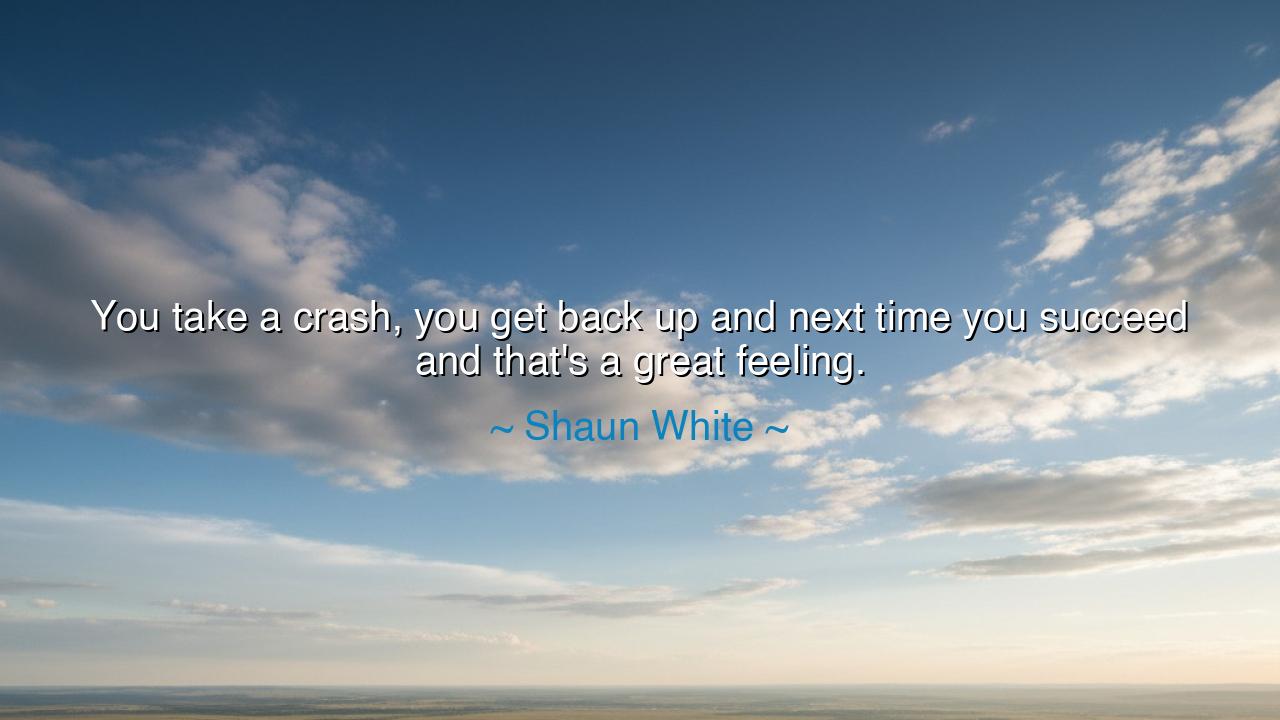
You take a crash, you get back up and next time you succeed and
You take a crash, you get back up and next time you succeed and that's a great feeling.






“You take a crash, you get back up and next time you succeed and that’s a great feeling.” Thus spoke Shaun White, the warrior of snow and sky, whose life was carved not only by triumph but by the scars of the fall. His words are simple, yet they resound like the wisdom of ages — the law of all creation, the rhythm of every human struggle: that failure is not the end, but the beginning of mastery. He speaks as one who has tasted both defeat and glory, who has flown, fallen, and risen again — and in doing so, he offers to all who strive this immortal truth: resilience is the breath of greatness.
In the ancient world, the same truth was spoken beneath different skies. The Greeks told of Sisyphus, who rolled his stone up the mountain only to see it fall — again and again. Yet in his ceaseless effort lay a kind of triumph, a defiance against despair. The samurai of Japan trained not for perfection, but for discipline in imperfection — to rise each time their sword struck air instead of armor. And the Romans, hardened by battle, taught their sons that valor was not measured by victory, but by the courage to stand again after every fall. So too does Shaun White’s quote echo this eternal lineage: the ancient creed of perseverance reborn in the modern soul of an athlete.
White’s own story gives life to his words. From a young age, he hurled himself down icy slopes, chasing what others thought impossible. He broke bones, shattered boards, and suffered humiliating defeats — yet every crash became a lesson, every bruise a mark of progress. When he missed the podium, he did not curse fate; he trained harder. When he failed, he returned to the mountain. And at last, after countless falls, he soared — performing spins and flips that defied the limits of the human body. His victories were glorious not because they came easily, but because they were built upon the wreckage of a thousand failures. His great feeling, as he calls it, is the joy known only to those who have fallen deeply and yet risen higher still.
There is a deep philosophy of motion within his words. For life itself is a series of ascents and descents — each crash a reminder of our frailty, each recovery a testament to our will. The mountain may change form — for some it is sport, for others it is work, art, love, or faith — but the law remains the same. Progress demands failure. The one who fears falling will never fly; the one who endures falling will one day learn the rhythm of the wind. In every age, from the inventor who toils in solitude to the leader who rebuilds after ruin, greatness has belonged to those who refused to stay down.
Consider Thomas Edison, who once said, “I have not failed. I’ve just found 10,000 ways that won’t work.” Like White, Edison faced his share of “crashes” — devices that burned out, ideas that fell apart — but he rose each time, guided by the vision of what could be. When at last he brought forth light, it was not only an invention he offered to humanity, but a lesson: that persistence is the bridge between defeat and triumph. From his lamp, as from White’s mountain, shines the same flame — the fire of endurance that makes all creation possible.
Shaun White’s wisdom, then, is not merely about sport, but about the human spirit itself. To fall and rise again is to participate in the oldest act of courage. The crash humbles us, teaches us, strips us of illusion; the ascent restores us, strengthens us, reminds us of what we are capable of becoming. Between those two moments — fall and rise — lies transformation. Those who never fall never grow; those who never risk never live. The great feeling White speaks of is not pride, but gratitude — gratitude for the struggle that gave his success meaning.
So let this be your lesson, seeker of strength: do not fear the crash. Welcome it as the teacher it is. When you fall, do not linger in the dust; stand, even if trembling. The next ascent will be higher, the air clearer, the view more radiant. Whether your mountain is a dream or a duty, climb it with patience, for greatness is not found in never failing, but in never yielding.
And when, at last, you rise — after the stumbles, the tears, the long silence of effort — you will feel what Shaun White felt: that “great feeling” that belongs only to those who have wrestled with defeat and turned it into strength. It is the feeling of one who has met himself in the valley, and found within his own heart the power to ascend again. It is the feeling of victory — not over others, but over despair. It is the eternal triumph of the human will.






AAdministratorAdministrator
Welcome, honored guests. Please leave a comment, we will respond soon